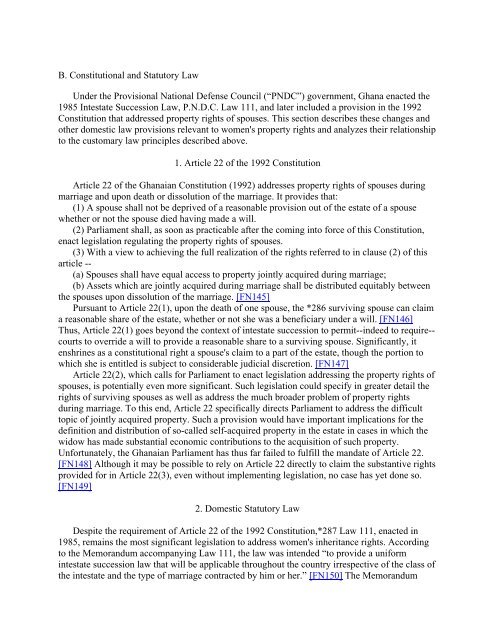Law, Culture and Women's Inheritance Rights in ... - Leitner Center
Law, Culture and Women's Inheritance Rights in ... - Leitner Center
Law, Culture and Women's Inheritance Rights in ... - Leitner Center
Create successful ePaper yourself
Turn your PDF publications into a flip-book with our unique Google optimized e-Paper software.
B. Constitutional <strong>and</strong> Statutory <strong>Law</strong><br />
Under the Provisional National Defense Council (“PNDC”) government, Ghana enacted the<br />
1985 Intestate Succession <strong>Law</strong>, P.N.D.C. <strong>Law</strong> 111, <strong>and</strong> later <strong>in</strong>cluded a provision <strong>in</strong> the 1992<br />
Constitution that addressed property rights of spouses. This section describes these changes <strong>and</strong><br />
other domestic law provisions relevant to women's property rights <strong>and</strong> analyzes their relationship<br />
to the customary law pr<strong>in</strong>ciples described above.<br />
1. Article 22 of the 1992 Constitution<br />
Article 22 of the Ghanaian Constitution (1992) addresses property rights of spouses dur<strong>in</strong>g<br />
marriage <strong>and</strong> upon death or dissolution of the marriage. It provides that:<br />
(1) A spouse shall not be deprived of a reasonable provision out of the estate of a spouse<br />
whether or not the spouse died hav<strong>in</strong>g made a will.<br />
(2) Parliament shall, as soon as practicable after the com<strong>in</strong>g <strong>in</strong>to force of this Constitution,<br />
enact legislation regulat<strong>in</strong>g the property rights of spouses.<br />
(3) With a view to achiev<strong>in</strong>g the full realization of the rights referred to <strong>in</strong> clause (2) of this<br />
article --<br />
(a) Spouses shall have equal access to property jo<strong>in</strong>tly acquired dur<strong>in</strong>g marriage;<br />
(b) Assets which are jo<strong>in</strong>tly acquired dur<strong>in</strong>g marriage shall be distributed equitably between<br />
the spouses upon dissolution of the marriage. [FN145]<br />
Pursuant to Article 22(1), upon the death of one spouse, the *286 surviv<strong>in</strong>g spouse can claim<br />
a reasonable share of the estate, whether or not she was a beneficiary under a will. [FN146]<br />
Thus, Article 22(1) goes beyond the context of <strong>in</strong>testate succession to permit--<strong>in</strong>deed to require-courts<br />
to override a will to provide a reasonable share to a surviv<strong>in</strong>g spouse. Significantly, it<br />
enshr<strong>in</strong>es as a constitutional right a spouse's claim to a part of the estate, though the portion to<br />
which she is entitled is subject to considerable judicial discretion. [FN147]<br />
Article 22(2), which calls for Parliament to enact legislation address<strong>in</strong>g the property rights of<br />
spouses, is potentially even more significant. Such legislation could specify <strong>in</strong> greater detail the<br />
rights of surviv<strong>in</strong>g spouses as well as address the much broader problem of property rights<br />
dur<strong>in</strong>g marriage. To this end, Article 22 specifically directs Parliament to address the difficult<br />
topic of jo<strong>in</strong>tly acquired property. Such a provision would have important implications for the<br />
def<strong>in</strong>ition <strong>and</strong> distribution of so-called self-acquired property <strong>in</strong> the estate <strong>in</strong> cases <strong>in</strong> which the<br />
widow has made substantial economic contributions to the acquisition of such property.<br />
Unfortunately, the Ghanaian Parliament has thus far failed to fulfill the m<strong>and</strong>ate of Article 22.<br />
[FN148] Although it may be possible to rely on Article 22 directly to claim the substantive rights<br />
provided for <strong>in</strong> Article 22(3), even without implement<strong>in</strong>g legislation, no case has yet done so.<br />
[FN149]<br />
2. Domestic Statutory <strong>Law</strong><br />
Despite the requirement of Article 22 of the 1992 Constitution,*287 <strong>Law</strong> 111, enacted <strong>in</strong><br />
1985, rema<strong>in</strong>s the most significant legislation to address women's <strong>in</strong>heritance rights. Accord<strong>in</strong>g<br />
to the Memor<strong>and</strong>um accompany<strong>in</strong>g <strong>Law</strong> 111, the law was <strong>in</strong>tended “to provide a uniform<br />
<strong>in</strong>testate succession law that will be applicable throughout the country irrespective of the class of<br />
the <strong>in</strong>testate <strong>and</strong> the type of marriage contracted by him or her.” [FN150] The Memor<strong>and</strong>um


